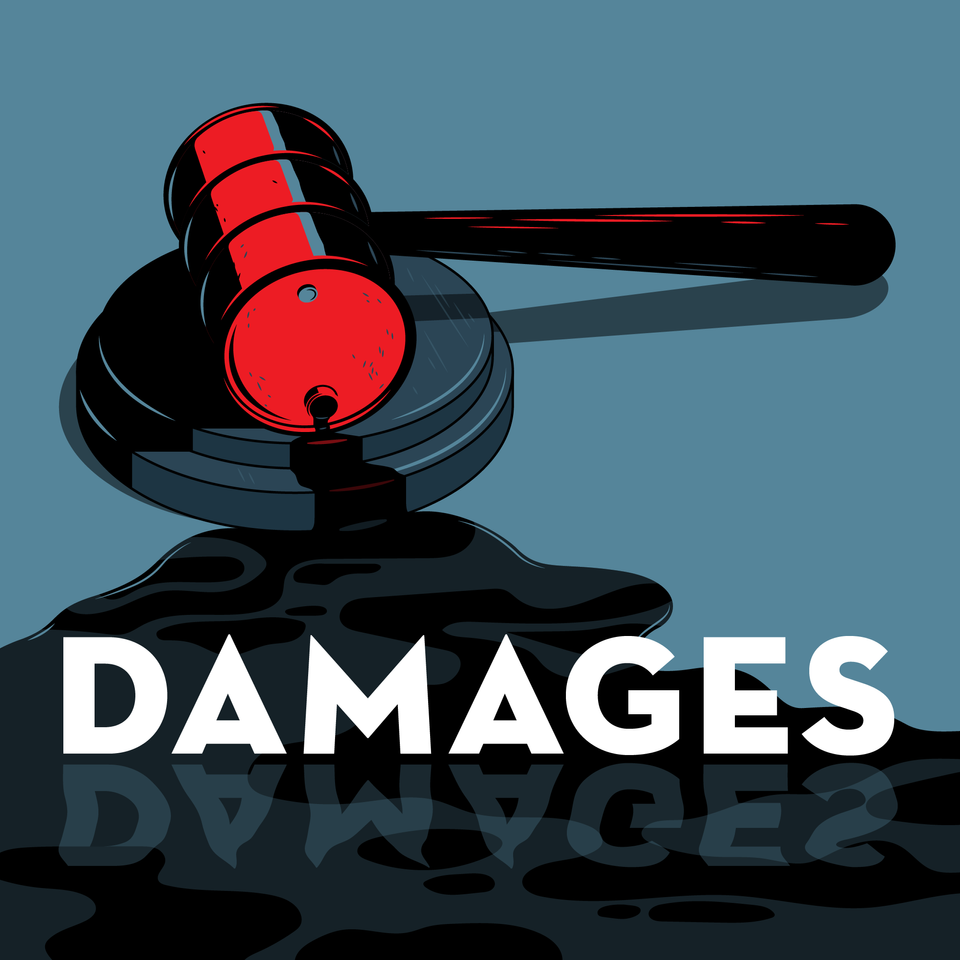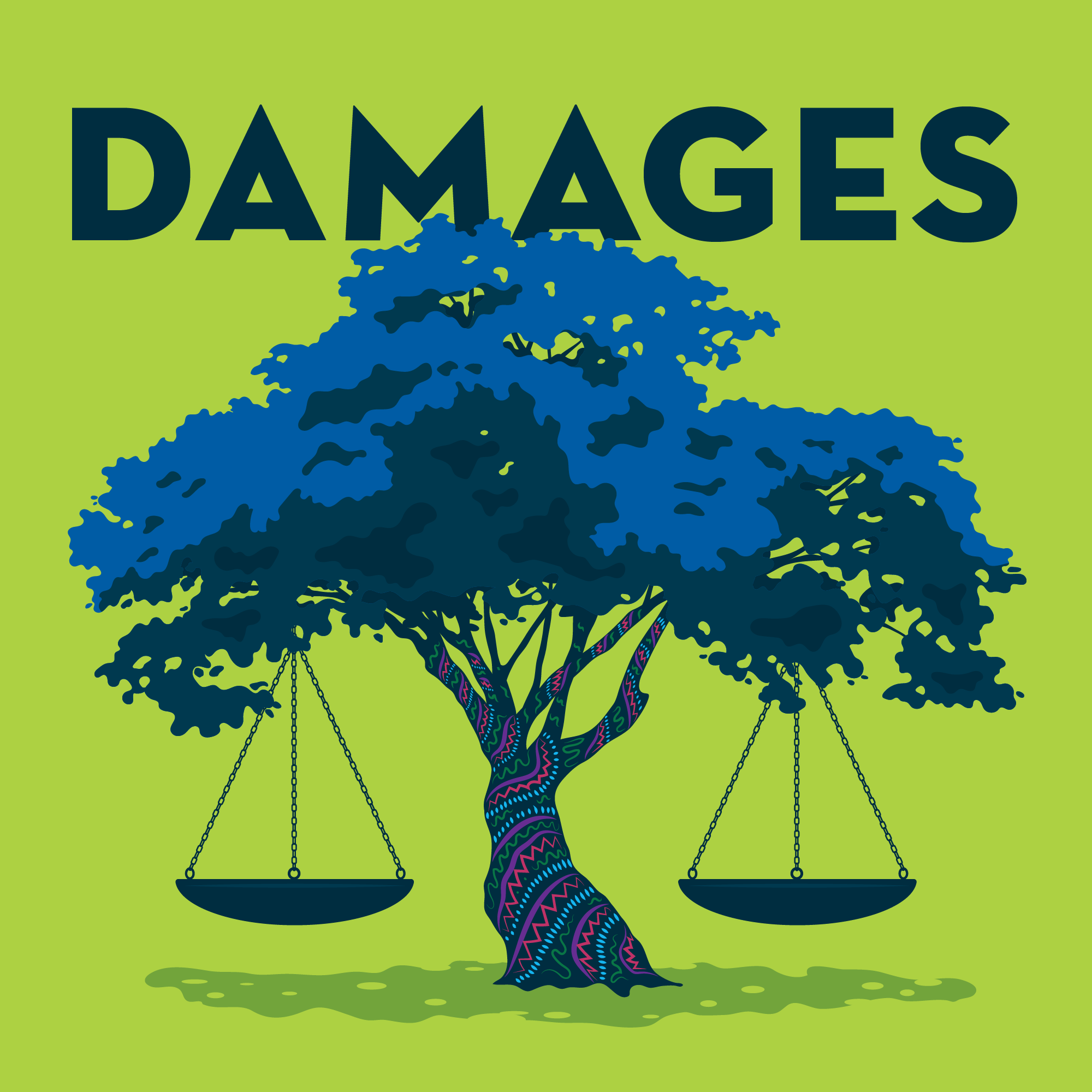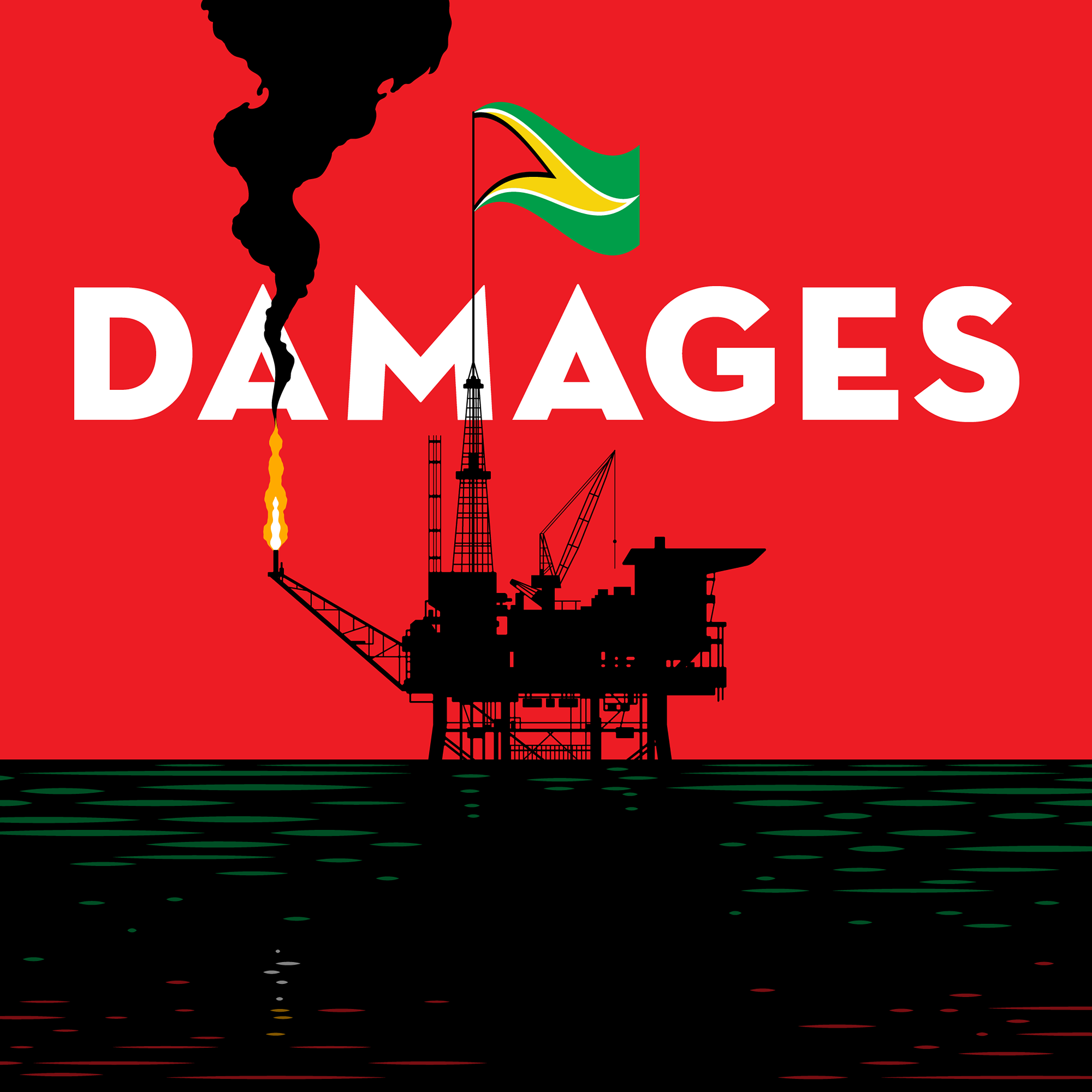Damages

From the creators of Drilled, Damages is a new podcast that follows the hundreds of climate lawsuits currently unfolding all over the world. We think of it as Law & Order meets the climate crisis.

S1: The Forest for the Trees
In our launch season we delve into rights-of-nature laws in countries all over the world, including attempts by some local and tribal governments in the U.S. to apply the concept in American courtrooms. Rights of nature incorporates Indigenous approaches to nature into Western judicial systems by giving ecosystems the same rights that individuals have…which might sound really out there, but is it really so different from giving corporations human rights? Through the stories of cases brought on behalf of wild rice (Minnesota), a cloud forest (Ecuador), a mountainous region (New Zealand), and a lake (Ohio), we’ll look at the philosophical and legal roots of this idea, how it’s played out in the past, and how it could catalyze climate action.
Ep 1: Manoomin v. Minnesota
For the Ojibwe, wild rice – manoomin in Ojibwe – is sacred. It’s also an indicator species; if the rice isn’t growing on the northern lakes, the water has been contaminated. When Minnesota’s Ojibwe bands saw what was happening with Standing Rock in 2016, they knew it wouldn’t be long before they had a similar fight on their hands. So in 2018 they formalized something that had been included in every treaty between the tribe and the U.S. government: the rights of manoomin. They added the plant’s right to survive and thrive to the 1855 treaty, the document that governs the relationship between Ojibwe bands and the U.S. And in 2021, in an effort to stop Enbridge Energy’s Line 3 pipeline, the White Earth band of Ojibwe sued the Minnesota Department of Natural Resources for violating the rights of manoomin. The pipeline was still built but manoomin’s case is ongoing, and it could have major implications, not just for the Line 5 debate in Michigan, but also for tribal sovereignty and the ability of tribal courts to enforce tribal law.
Ep 2: Who Should Speak for the Trees?
In this episode we zoom out a bit and look at the history of rights of nature, its philosophical and legal roots, the form it’s taken in the U.S. and elsewhere, and why it has so much potential to shake up the legal system.
Ep 3: The Cloud Forest v. The Mine
Ecuador was the first country to adopt rights of nature into its constitution, but its Constitutional Court (Ecuador’s equivalent to the U.S. Supreme Court) has not heard many cases in the decade or so since the law was added. The new Constitutional justices made a point of picking several cases to test rights of nature, and in 2021 handed down a major judgement…in favor of Los Cedros, one of the most biodiverse cloud forests in the world, and against the Canadian company hoping to mine copper and gold there.
Bonus episode: Unpacking the Landmark Los Cedros Ruling
Last episode we told the story of Ecuador's rights-of-nature journey, today Melissa Troutman and Joshua Pribanic, directors of Invisible Hand and co-founders of the journalism organization Public Herald, join to talk about what the landmark Los Cedros ruling means, not just for Ecuador but the world.
Ep 4: Children of the Mist
Te Urewera is the largest rainforest on New Zealand’s North Island, spanning 2,127 sq km of hills, vast blue-green lakes, waterfalls and fast-running rivers. In 2014, a world-first law brought an end to government ownership of Te Urewera National Park and recognized the rainforest as its own legal entity and the Tūhoe people as its legal guardians. The international rights-of-nature community heralded it as an enormous win, and still point to it as the gold standard. But the Tūhoe see the shift as merely a step in the direction of their land being returned to them.
Bonus: Responsibilities, Not Rights—a Tūhoe Perspective
When Tūhoe negotiated legal personhood for their homeland Te Urewera, the global rights of nature community cheered. But in this conversation about how the case connects to rights of nature overall and to the global push for climate action, Tamati Kruger, Tūhoe negotiator and chairman of the board that now oversees Te Urewera, explains that for Tūhoe it's about responsibilities—of people to protect the land and each other—not rights.
Ep 5: The Backlash
In 2019, after a years-long campaign, voters in Toledo Ohio voted to approve the Lake Erie Bill of Rights, effectively giving the lake personhood. It drew an incredible amount of attention. This wasn’t San Francisco hippies or Brooklyn hipsters talking about rights of nature, this was middle-aged moms in the Rust Belt, and that absolutely terrified any extractive industry. Agrichemical companies turned out in force against the bill, BP spent a fortune to try to stop it, and almost as soon as it passed it was being questioned in court. Then in 2020 the state smuggled a ban against rights-of-nature legislation into its annual budget bill. Similar preemptive bans on rights of nature have since been passed in Florida and Missouri. As one Ohio campaigner put it, “You know what you’re doing is working if they’re going around the country trying to preempt it.” In this ep we look at where the rights of nature movement is today, how the fossil fuel industry has responded, and what’s next.
S2: Law School
In season 2 we took a step back to set the stakes and explain some of the key concepts in climate litigation, from ecocide to international arbitration and beyond.
S2 Ep 1 | Ecocide
With an internationally accepted definition of this crime, advocates are pushing for international courts to recognize it as well, and they're making progress. In this episode we explore what that means, what an ecocide trial might look like, who's most likely to be hauled into court for it, and the overarching goal of the effort.
S2 Ep 2 | Secret Tribunals
A clause in most free trade agreements and investment treaties obligates countries to engage in a process known as international arbitration if there's a dispute with a foreign company. It was meant to assure companies that their investments in especially less developed countries were safe, but in recent years it's become a way to punish governments for passing environmental regulations.
S2 Ep 3 | An Update on the Big U.S. Youth Climate Case
Juliana v United States was one of the first big youth climate cases, and it has inspired several others. In 2021, it looked like the case was dead in the water, but it's back now with one more shot... and a new Netflix documentary on the case too! (Check out Youth v Gov here)
S2 Ep4 | What Can the UN Actually Do About Climate?
Compensation for climate change has been a hot topic at the UN since the early 90s. For countries already experiencing what the UN calls loss and damage the main goal has always been to prevent more damage. But fossil fuel lobbyists had different ideas. Now a new IPCC report gives evidence that could influence what happens at the UN and in court cases around the world.
S2 Ep 5 | On Judges, Juries, and Precedent
In many of the countries where some of the world's largest climate cases are unfolding, the legal system looks very different than it does in the former English colonies. In much of Europe and Latin America, for example, the Roman system dominates and it works very differently, with judges gathering their own evidence in cases. Another key difference? Reliance on precedent in common law countries like the U.S. ... a topic that's becoming more important to understand every week.
S2 Ep6 | False Friends of the Court
I have been wondering for months what possible sense it makes for every right-wing think tank to have an amicus program. I mean...is any judge really surprised to learn that the Cato Institute is against regulation? But these are not folks who spend money on things for no reason, and the presence and size of amicus programs at conservative "public interest" law firms and think tanks have been growing exponentially over the years, so I reached out to the only person I've ever seen mention this in public: Senator Sheldon Whitehouse. He had all the answers I was looking for and then some.
SCOTUS Is Back in Session: Here Are the Climate Cases to Watch For
West Virginia v EPA isn't the only big climate case before the Supreme Court this year, from questioning the SEC's disclosure rules to major Clean Water challenges there's a lot more to come. EarthJustice's Sam Sankar and Kirti Datla join to give us a preview of what to watch for in the court's Fall session.
First Climate RICO Filed + James Hansen Sues the EPA
November was a big month for climate litigation! The first-ever climate RICO was filed on behalf of 16 Puerto Rican municipalities, plus a cohort of scientists and researchers, including NASA scientist James Hansen, sued the EPA to compel them to regulate greenhouse gas emissions under the Toxic Substances Control Act.

S3: Light, Sweet Crude
For decades now, the fossil fuel industry has told the same story: Oil equals development and prosperity. Access. Equality. Stability. A better quality of life. As the world’s fossil fuel companies race to tap the last of the planet’s oil reserves we have a chance to examine that promise up close, in real time.
Several miles off the coast of Guyana sits one of the world’s largest oil reserves. In 2015, ExxonMobil, which had held offshore drilling leases in the country for decades, announced it had found oil and would begin production as soon as possible. Government officials quickly got in line, and in 2019 the first barrels shipped from ExxonMobil Guyana. Today, Exxon projects that oil from Guyana could account for 25% of its total production in the next few years. But environmentalists and government corruption watchdogs have begun to push back on the project. Why start an oil industry in the midst of climate crisis? And especially in a country at great risk of climate impacts? Via a contract that will sooner put Guyana in debt than make it a rich oil state, no less?
In just a few years, Exxon has co-opted both government and civil society, buying up social license in every corner of the country. Oil executives and Guyanese officials are still telling the story that oil equals development and prosperity, and on paper Guyana is the fastest-growing economy in the world, but average citizens aren’t benefiting from the boom. Today, there’s only one journalist left covering the project with any sort of skepticism, and one lawyer left willing to take it on in court. In this special crossover season of Drilled and Damages, we look at what oil colonialism looks like in the 21st century, and why everyone should care.
S3 Ep1 | The Boom
Five years ago, Kiana Wilburg was a new reporter when ExxonMobil executives and Guyanese government officials announced they had found oil 40 miles offshore. Wilburg and her newsroom had to quickly learn about the industry and this company that was suddenly so influential in their country and were left with just one question: exactly what kind of a deal had the country signed onto? Transcript
